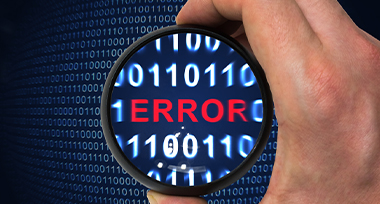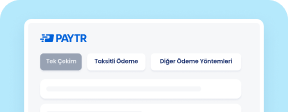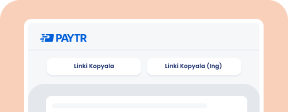PayTR Online Payment and Fintech Glossary
E-commerce site, online payment systems, secure e-commerce, Virtual PosWe have created the most comprehensive PayTR Online Payment and Fintech Glossary for you, which you can always benefit from as a guide, regarding the terms that we frequently encounter on the internet related to fintech and online payment and which are now in our lives, legal regulations, laws, compliance, standards and certifications related to the sector.
A
-
Infrastructure Provider
It is the name given to the institutions authorized under the law that provide the requirements for opening an online shopping site or using a payment system. To open an online shopping site, you may need services such as e-commerce software, web hosting and domain name. Receiving online payments, Virtual Pos you also need infrastructure services from payment institutions.
-
AML – ANTI MONEY LAUNDERING
AML includes all laws, regulations, procedures and systems put in place to prevent money laundering.
-
API
API, which stands for Application Programming Interface, allows a software to interact with other software and exchange information. With the use of API, a website can benefit from the services offered by the software provider and offer it to its visitors.
-
Subscription Model
With the subscription model, which is a business model used by companies to generate revenue, you can deliver products and services to consumers at certain intervals. Sending a monthly package to the subscription consumer, regular online payments of digital services such as Spotify and Netflix, which are very popular today, are examples of the subscription business model.
-
Open Banking
The new services and applications that third-party developers provide around financial institutions with the help of APIs are called Open Banking. For example, being able to access all your bank accounts with a mobile application, and being able to perform various transactions with your bank account from another application (which were only done through bank channels before Open Banking) are examples of Open Banking.
B
-
Bank Card
Debit card, ATM, POS card provided by banks to consumers and businesses, Virtual Pos and cards they can use on the internet.
-
BRSA
The Banking Regulation and Supervision Agency (BRSA) is a board that independently exercises the regulatory and supervisory duties and powers assigned to it by the Banking Law No. 5411 and other legislation under its own responsibility.
-
BITT
BITT, short for Bank Insurance Transaction Tax, is basically a type of tax. It is levied on various transactions carried out through banks (such as income from securities, commissions and fees) at a predetermined BITT rate.
-
Blockchain
The concept of blockchain, also translated into Turkish as blockchain, is actually the name given to the technology underlying Bitcoin, which became popular with Bitcoin. The blockchain is a database system that eliminates the intermediary by making transactions visible to everyone and cannot be changed later. It is so named because the data related to transactions is kept in blocks and grows by being added to each other.
-
Bitcoin
Bitcoin is a digital currency created in January 2009 by a person or persons with the pseudonym Satoshi Nakomoto. The rapid rise and fall of Bitcoin prices has played a major role in the popularity of cryptocurrency. Cryptocurrency, which uses blockchain infrastructure, is decentralized, that is, unlike the currencies we know, it works without being connected to a central point such as a central bank. Bitcoin, which is purely digital, was later opened to physical access like a debit card or credit card and started to be used for withdrawing money from compatible ATMsand traditional internet shopping. However, widespread use is through mobile applications via digital wallets.
-
Big Data
The rapid growth in the volume of structured and unstructured data and the speed of data creation and storage has led to the term Big Data. Big Data consists of data from multiple sources and is too large for humans to process without auxiliary tools.
-
Information Security Policy
It is a set of rules and practices that regulate issues such as the management, protection and distribution of valuable information belonging to businesses and the functions around them. Especially large organizations determine cyber security and data privacy policiesby creating an information security policy. The information security policy determines by whom, how, when, how deep the access to a data will be and what can be done with this data.
-
Blog
Blog, which emerged from the abbreviation of the words web log, defines the content that one or more individuals and organizations circulate on the internet. Blog owners who prepare blog posts are called bloggers.
-
Blocked Amount
A sum of money held against a specific payment or transaction and prevented from being spent or used. The blocked amount can be blocked for a specific or indefinite period of time.
-
BKM Express
The BKM Express application, prepared by the Interbank Card Center (BKM), is a free and practical payment solution that eliminates the need to carry a card and enables secure online payments without entering card information for online shopping, without sharing card information with the merchant.
C – C
-
Chargeback (Chargeback)
Chargeback, in other words, is the process of refunding the money after the customer’s objection to the purchases made. However, the difference from a refund is that the product or service received is not received by the person, and it is realized as a result of receiving faulty or defective products or services.
-
CVV (CVC)
CVV/CVC (Card Verification Value/Code) are the three (last) digits on the back of debit and credit cards. These numbers are used to verify the cardholder, especially when shopping online.
-
Chatbot
Chatbot, which is the abbreviation of chat robot, is used in Turkish as chat robot or chat robot. Artificial intelligence and machine learning supported chatbots are generally used in e-commerce and customer service. The chatbot, which provides convenience to perform simple transactions, provides information by answering the person’s questions, provides convenience, speed and cost advantage by taking the burden of tasks such as purchasing, learning product features, performing an after-sales transaction from human employees.
-
Cryptocurrency (Cryptocurrency)
Cryptocurrencies are digital and virtual currencies based on decentralized systems, the vast majority using blockchain technology, distributed ledgers, and cryptography for security.
D
-
Debit Card
Debit card is the name given to plastic, electronic cards that are linked to a bank account. It is used for ATM transactions, shopping via POS and Virtual POS.
-
Digital Wallet
A digital wallet is a software or application that can be used on computers and mobile devices, holding together store of value such as debit cards, prepaid cards, virtual cards, credit cards, cryptocurrencies, loyalty cards, etc. It provides convenience to users by enabling the storage, spending and accumulation of money and values.
-
Digital POS
The digital version of Point of Sale (POS) systems is called Digital POS. Used only as software Virtual Pos (Virtual POS) subtype. In fact, the name Digital POS is also used for POS as all POS devices process data digitally, but mobile POS (mPOS) and Virtual Pos After its use became widespread, it came to be used only as an umbrella name to group them.
-
Digital Payments
Payments made on the internet are called digital payments. Debit and credit cards, cryptocurrencies or remittances made through online banking are included in the scope of digital payments. Electronic devices, infrastructures and systems such as computers, smartphones and tablets are used for online payments.
E
-
E-commerce
E-commerce is the process by which individuals and organizations make purchases over electronic networks such as the internet. This process, which is also generalized as online shopping or internet shopping, is realized with more than one business model. The most preferred electronic commerce business models are B2B (business to business), B2C (business to consumer), C2C (consumer to consumer) and C2B (consumer to business).
-
EMV (EUROPAY, MASTERCARD AND VISA)
The payment methodrealized with smart payment cards, payment terminals and ATMs is called EMV. These cards, referred to by EMV, the abbreviation of the names of the companies that created the standard, carry magnetic tape and an integrated chip. These chips are valid in new generation POS devices, as well as enabling contactless payments using NFC (Near Field Communication).
-
ETBIS
The information system established by the Ministry of Customs and Trade for the purpose of registering service providers and intermediary service providers, collecting e-commerce data and processing these data into statistical information is called ETBIS. ETBIS is the abbreviation of Electronic Trade Information System.
-
Electronic Money
Money held on information systems is known as electronic money or e-money. It can be converted into physical money or it can be used in electronic transactions without physical money.
-
EFT
EFT, short for electronic funds transfer, refers to the transfer of value in computerized networks, usually between banks.
F
-
Fraud
Fraud, or fraud, is the general name for transactions that generate unfair profits in the online payment and fintech world. Payment institutions use anti-fraud systems to ensure the safety of their customers and consumers.
-
Fintech (Fintech)
Fintech, which is the abbreviation of financial technologies and translated into Turkish as fintech, describes the response of recent technological developments in the field of finance. Examples of fintech include mobile wallets, cryptocurrencies, smart budgeting tools.
-
FOREX (Foreign Exchange)
Forex (FX) is an exchange structure that allows the exchange of national currencies. Forex exchanges are the world’s largest market in terms of liquidity. Trillions of dollars change hands every day in these systems, also known as Forex. The decentralized FX market is traded on an electronic network of banks, brokers, financial institutions and independent traders.
G
-
Entrepreneur
The name given to individuals who start a new business and take risks, has recently been replaced by the name of people who pursue innovation and create new ideas, services, business lines or business processes.
-
Secure Mobile Payment
Secure payments made via mobile devices such as smartphones and tablets are the general name given to money transfers.
H
-
Remittance
The process of sending money through a bank is called wire transfer. Remittance is usually between accounts at the same bank.
-
HTTPS
HTTPS, short for HTTPS (Hypertext Transfer Protocol Secure), is the addition of a layer of security to the web’s main protocol, HTTP, through identification and encryption. Communicated through network port 443 instead of 80, the protocol is activated by installing SSL/TLS certificateson the web server.
I – I
-
Internet Bot
Internet bot is short for internet robot and is the basic name for software that performs automated tasks on the internet.
-
IoT (Internet of Things)
IoT, translated into Turkish as the Internet of Things, is the name given to devices, systems and objects that enable communication between machines without the need for human-to-human or human-to-machine communication.
-
Internet Banking
Internet banking, also known as online banking, enables banking services to be performed without going to a branch, phoning the bank, using an ATM, using a computer, smartphone or mobile device.
K
-
Card Number
The 16-digit number on plastic cards is called a card number. Card numbers have a specific code pattern, i.e. they are generated by an algorithm from information such as bank, country, branch and account number.
-
Personal Data
Personal data, also referred to as personal information in some sources, includes all private, general or sensitive information that enables an individual to be identified.
-
KKB
Established with the participation of nine banks, Kredi Kayıt Bürosu (KKB) was founded on April 11, 1995. It prepares the credit rating, also known as credit rating, which is created by compiling bank customers’ past payments, current debt status, number and frequency of loans.
-
KVKK
The Law on the Protection of Personal Data (KVKK) is the law that regulates how the data of persons within the borders of the Republic of Turkey will be stored, used and processed. It ensures that data processing activities are carried out within the framework of predetermined rules and protects the fundamental rights of individuals
-
Commission
A commission is a group of people formally appointed or elected to find out the cause of a problem or information about a problem.
-
KYC (Know Your Customer)
Know Your Customer, abbreviated as KYC, means know your customer. KYC is the process by which organizations identify their customers and determine their suitability in terms of business relationships and the risks they pose.
-
Card storage
This process, secured by PCI DSS security certification, ensures the secure storage of credit and debit card information. Card storage gives consumers the advantage of avoiding the hassle of repeatedly entering card information for frequent purchases.
-
SME
SME, short for small and medium-sized enterprise, is used to group businesses below a certain value in terms of revenue, assets and number of employees. Each country and sector has a different SME classification.
L
-
Link Payment
Payment by link is an innovative financial solution that enables payment via a link sent over the internet. Thus, it enables online shopping and money transfer from different social media channels such as WhatsApp and Instagram.
M
-
MASAK
The Financial Crimes Investigation Board (MASAK) is a financial intelligence unit established to combat money laundering. It was established on the recommendation of the FATF, a standard-setting organization for combating international money laundering and terrorist financing.
-
Mersis Number
MERSIS (Central Registry Registration System) ensures that trade registry transactions are carried out electronically. It is a central information system where trade registry records, registrations and announcements are regularly stored and access to them electronically.
-
Mobile Payment
Although online payments made through all mobile devices are called mobile payments, payments made through telecommunication operators have recently embraced this concept. In this perspective, mobile payments are made by deducting the top-up of the line, the loaded TL or by reflecting it on the invoice.
-
Mobile Banking
The banking services offered by banks and financial institutions for mobile devices are called mobile banking. Although it is usually done via mobile application, it is also possible to access mobile banking via mobile web.
-
Mail Order
Mail Order is a system that allows the use of credit cards, POS devices and Virtual PosIt was one of the common methods of remote payment before the widespread use of POS. The card number, expiration date and CVV code are entered into a form and the process continues like a normal sales transaction by entering the card number, expiration date and CVV code into the POS device, even if the card is not physically present, and the payment is completed.
-
mPOS
Mobile POS (mPOS), which is a combination of a card reader and a mobile device such as a smartphone/tablet, enables payment without a standard POS device. mPOS combines the advantage of being easily transported anywhere and always connected to the network. The relevant mobile application of the bank is used for mobile POS usage.
N
-
NFC
Near-field Communication (NFC)
Near field communication (NFC), also known as near field communication in Turkish, is a wireless communication protocol that works over short distances. NFC is used for practical purposes such as data transfer and device pairing, and is also the basis of contactless payments. When a credit card with a contactless payment compatible chip is brought close to a POS device with an NFC reader, the information is transferred to the device and the payment transaction is realized.
O – O
-
OTP (One Time Password)
OTP, which stands for One Time Password, plays a critical role in payment security. OTP, the most common two-step security application, strengthens the authentication process by creating temporary passwords with a mobile application (e.g. Facebook Kodmatik) as well as via SMS over the phone. OTP, which was once utilized by banks with external devices, has taken its current form due to the widespread use of mobile devices and the lack of widespread consumer acceptance.
-
Online Payment
Making payments on the internet is called online payment. Transactions carried out using online payment systems are used in transactions such as e-collection, online collection, e-commerce, online shopping and create a strong alternative to payment / collection methods such as checks, promissory notes, cash, money orders and EFT.
-
Online Shopping
Online shopping, which is a form of electronic commerce, is defined as consumers or businesses making shopping transactions with other consumers or businesses over the internet. The shopping process is completed with online payment.
-
Authorization
Authorization, which is the Turkish word for authorization, means identification. Authorization, which is an information and information security term, determines who can access which data, how and to what extent.
-
Prepaid Card
A prepaid card, which does not have to be linked to a bank account, allows you to spend with the amount of credit in it and benefit from a product or service. There are also some alternatives known as gift cards. A prepaid card works by loading money or credit into it.
-
Payment Gateway
The payment gateway, which can be summarized as the structure used by payment institutions, mediates the transfer of payment from one party to another by receiving card or digital wallet data.
-
PAYMENT
The Payment and Electronic Money Association (ÖDED) was established in accordance with the Law No. 6493 on Payment and Securities Settlement Systems, Payment Services and Electronic Money Institutions. It is a sector association representing companies that provide payment and electronic money services in Turkey and have the status of payment and electronic money institutions.
-
Payment Institution
Companies that support payment methods such as debit cards, credit cards, etc., process and execute the payment between two parties and mediate related transactions are called payment institutions.
-
Onboarding
Onboarding, translated into Turkish as recruitment and familiarization, also summarizes all the practices that enable a customer to learn while using a product or service for the first time.
-
oWallet
The new contactless mobile payment infrastructure based on Apple and Android Wallet technologies by two Turkish companies, OVO and PayTR, the official payment institution authorized by the BRSA, is called oWallet.
P
-
Market Place
In the world of e-commerce, a marketplace is a place where products and services are listed and exchanged or traded. Examples of marketplaces that offer one of the most popular online shopping environments are Ebay, Sahibinden, Gittigidiyor.
-
Marketplace Solution
With the marketplace solution, a marketplace can be established in the e-commerce environment. The marketplace solution, which provides a multi-supplier online shopping environment, is an infrastructure that includes a payment system that enables individuals or organizations to list their products or services, search for what they want and shop online.
-
PCI-DSS
PCI-DSS, a standard set to protect sensitive financial data such as credit cards, is issued after a comprehensive audit, from infrastructure and technical facilities to technical and operational business processes. An e-commerce point using a PCI-DSS certificate is reliable because it fulfills the compliance requirements.
-
Prepaid
Prepaid, meaning prepaid, is often used for cards, but it is an umbrella term that covers the whole process of prepaid shopping.
R
-
Risk Management
Risk management is the process of identifying the risks that may arise due to payment transactions in advance and taking the necessary measures to prevent risks from occurring or to protect the parties in case of occurrence. Anti-fraud activities are carried out within the scope of risk management.
-
Reccuring (Recurrent Payments)
Repeated transactions performed with the permission of the customer are called recurring. For example, transactions such as subscription systems, automatic bill payments fall under the term recurring.
S – S
-
Virtual Card
Virtual credit cards or virtual debit cards are not physically issued by the card issuer. Therefore, they can be created free of charge and quickly, without the need for costs such as card production and shipping. Cards created in the digital (virtual) environment are suitable for purposes such as secure use or use within certain limits and easy tracking of expenditures.
-
Virtual Keyboard
The virtual keyboard, an online security application, allows payment information to be entered by changing key positions and sequences.
-
Forgery
Fraud, a type of fraud in payment systems security, describes the use of duplicate or counterfeit cards or illegal transactions. Cybercriminals or hackers are considered fraudulent when they make purchases or payments with the data they steal from the systems they enter over the internet.
-
SSL
SSL, which stands for Secure Sockets Layer, provides communication security on the computer network with encryption protocols. HTTPS or secure web and internet connection is provided with an SSL certificate.
-
Payment via SMS
SMS payment enables the purchase of products and services via text message. With the SMS payment system, consumers send a text message to share their information and confirm the purchase. An example is an additional internet package purchased by sending a text message from a mobile operator.
T
-
Token
A token is used to verify a person’s identity via a portable or mobile device, and uses credentials to do so. An example is a special device called a token that carries encrypted data, or accessing a service with passwords generated from a mobile device.
-
CBRT
Established in 1930 as a private legal entity, the Central Bank of the Republic of Turkey is also known by the abbreviation CBRT. The CBRT functions separately and independently from the state.
W
-
Wallet
Wallet, the English word for wallet, refers to digital wallets (electronic wallets) in e-commerce and fintech. It securely stores users’ payment information and passwords. It allows users to make easy payments. oWallet is one of the best examples of a new generation mobile payment product.
Y
-
Artificial Intelligence
Systems and processes that imitate human behavior and simulate human behavior are called artificial intelligence. Artificial intelligence systems, which are fed with data through machine learning techniques, are used in jobs such as fraud prevention and financial consultancy with behavior prediction and big data analysis in the field of finance.
Other
-
Law No. 6493
Under Law No. 6493 (Law on Payment and Securities Settlement Systems, Payment Services and Electronic Money Institutions), the BRSA licenses payment institutions and electronic money institutions. Services such as acquiring virtual POS, online shopping, online payment, e-collection, prepaid card, etc. can be performed with the license obtained under this law. Law No. 6493 provides for the licensing of payment institutions and electronic money businesses that meet the criteria set by the state and thus protect the consumer.
-
3D Secure
It is a security system named 3D Secure due to its 3-domain Structure system. It provides additional identification in transactions such as shopping and payment with credit and debit cards. 3D Secure verifies identity in addition to card information with a text message (SMS) sent to the user and prevents fraud and forgery.
Become a PayTR in 2 Hours!
Apply for PayTR Virtual Pos Now
Popüler Ürünler
Benzer Blog İçerikleri İlginizi Çekebilir

What is Virtual POS? How to Get Virtual POS?
Virtual POS systems are one of the most important motivations supporting the increasing e-commerce volume. Virtual POS (

Virtual POS Error Codes and Solutions
Virtual POS error codes prevent e-commerce activities from continuing uninterruptedly. It also creates a loss of reputat

10 Profitable Business Ideas for Those Who Want to Start Their Own Business
No matter how difficult economic conditions become, many people dream of starting their own business. Young, women, midd





